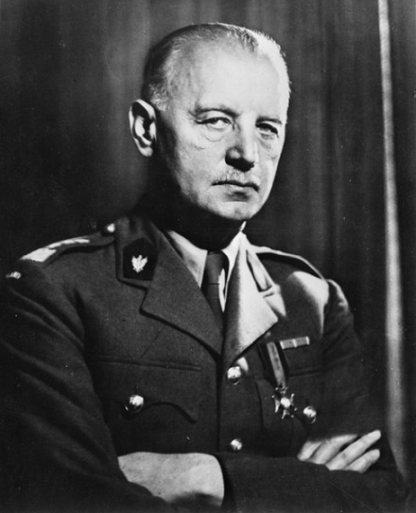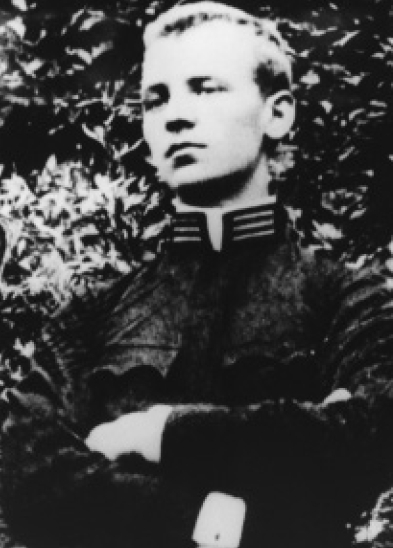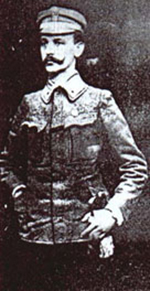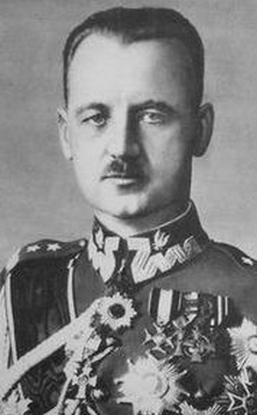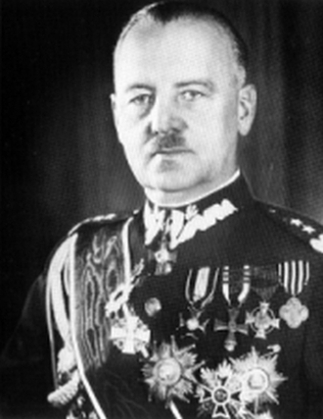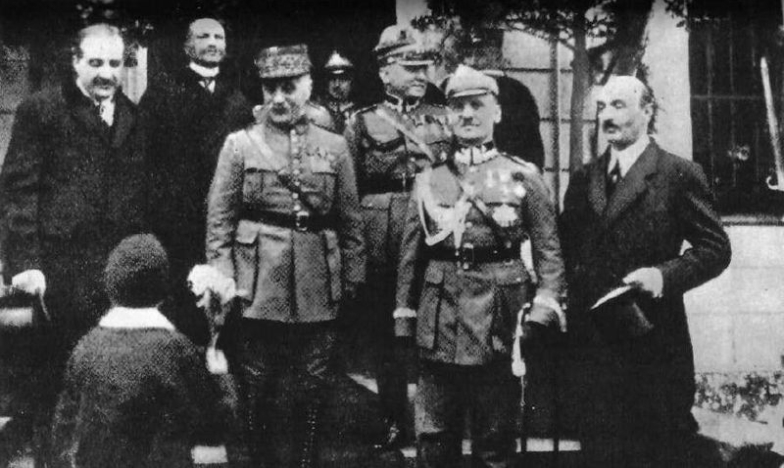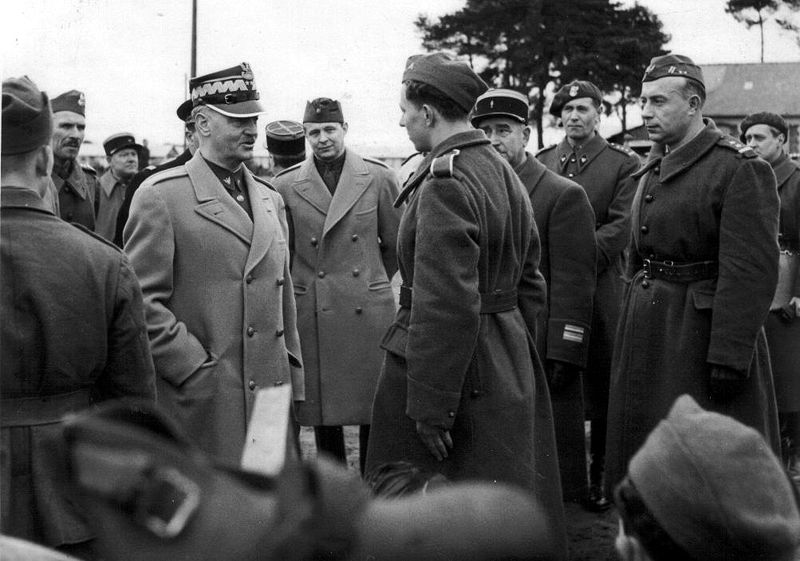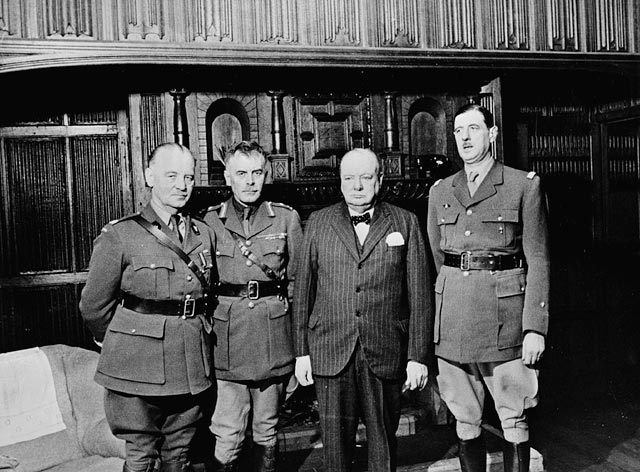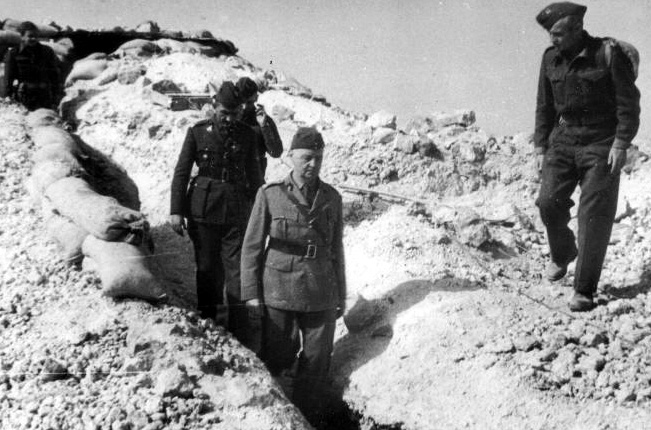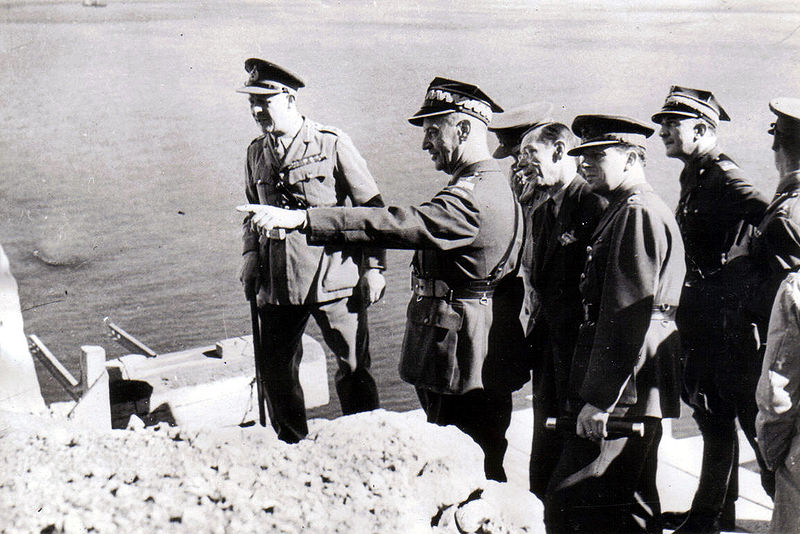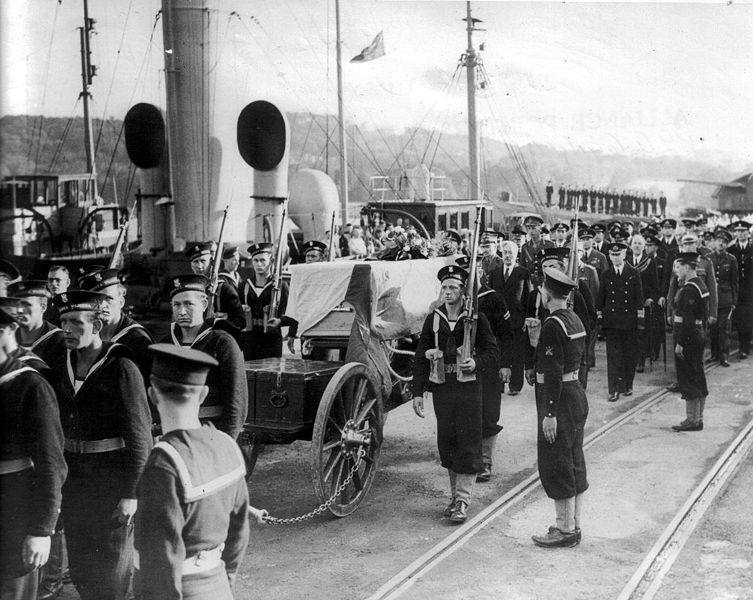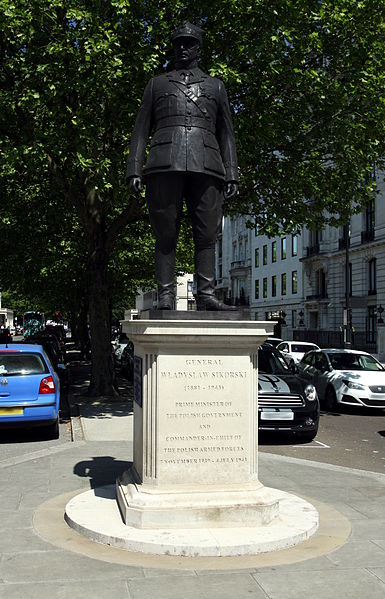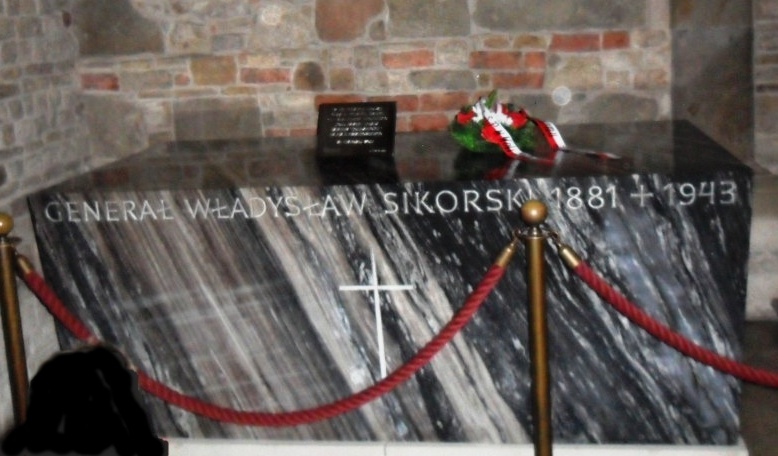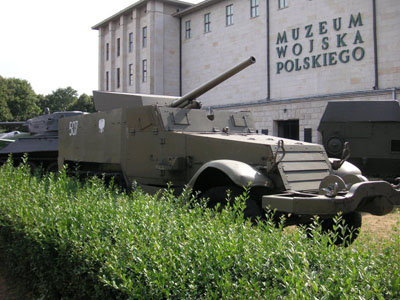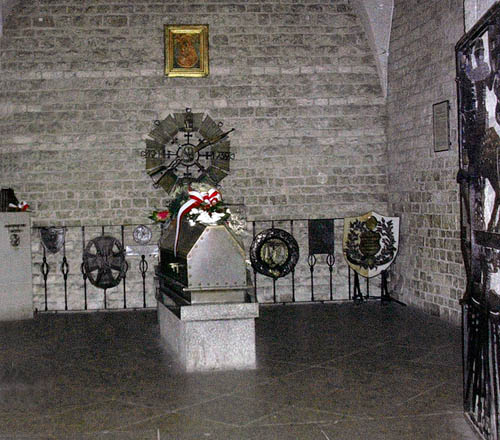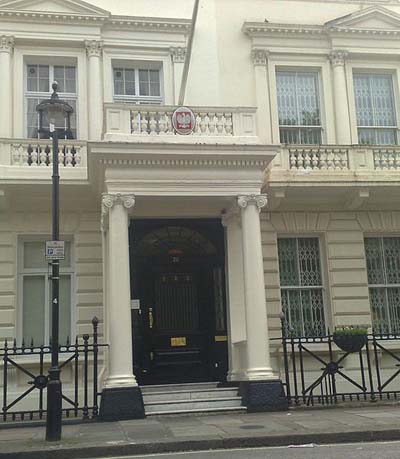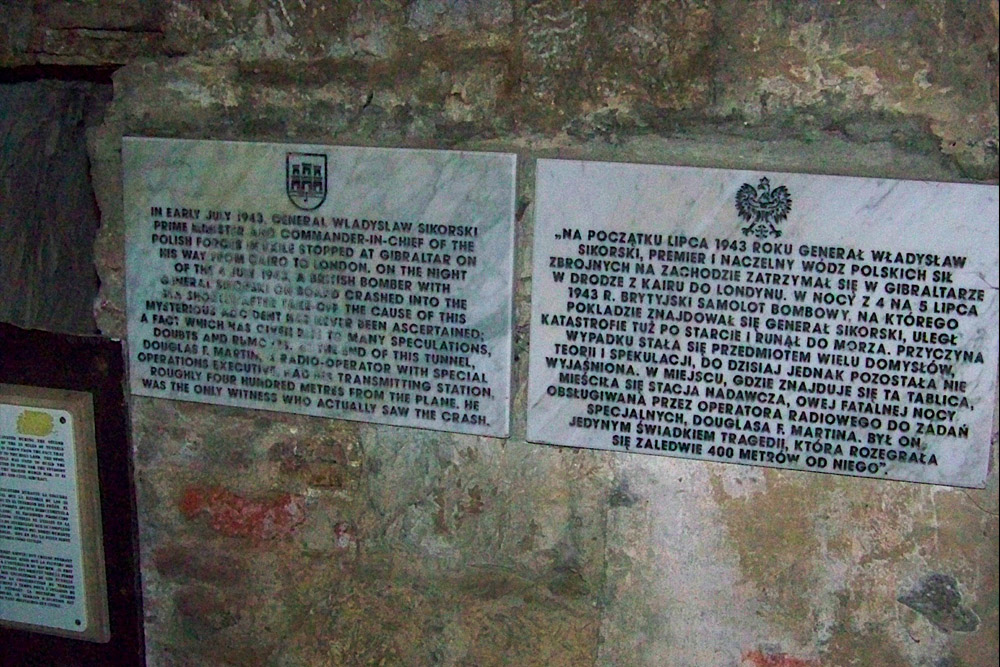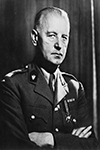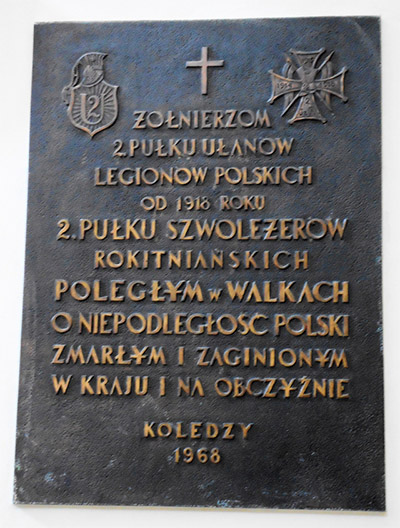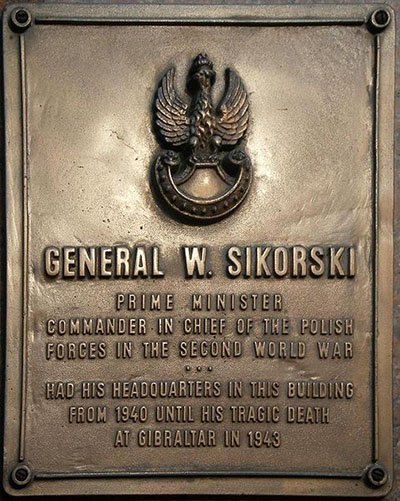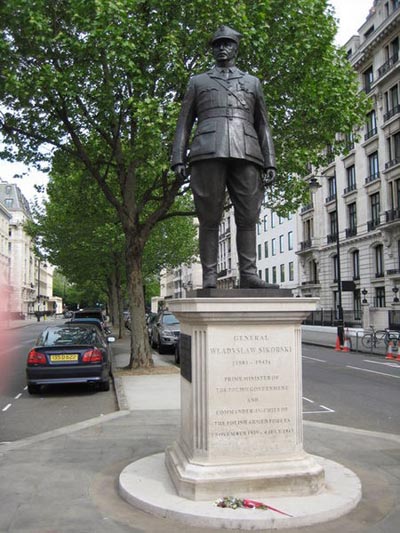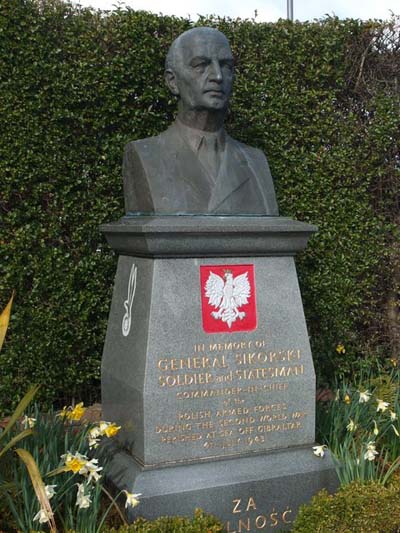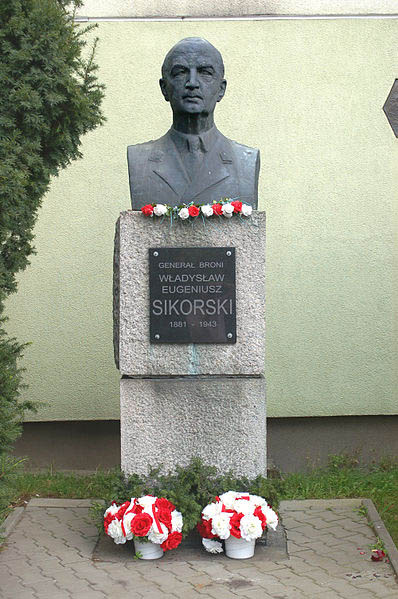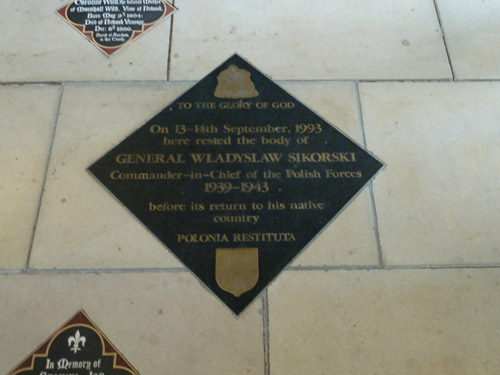Introduction
God looks into my heart. He sees and knows my intentions and designs which are clean and trustworthy. My only goal is a free, honest and united Poland."
– Wladyslaw Sikorski, 1943 at Buzuluk (in the former Soviet-Union).
Wladyslaw Sikorski, a veteran of the First World war, the Polish-Ukrainian war (1918-1919) and the Polish-Soviet war (1919-21) was between September 1939 and July 1943 the Prime Minister of the Polish government-in-exile in London and supreme commander of the Polish forces in the West. He revived the Polish army, which was in ruins and also took great pains to strengthen the Polish position within the Allied powers. Wladyslaw Sikorski lost his life on the fourth of July, 1943 in a plane crash in Gibraltar. To this day there are still many question marks about the background and cause of this accident.
Youth & education
Between 1893 and 1897, Sikorski attended grammar school in Rzeszów, after which he studied for a year at a teacher training college in Rzeszów. Between 1988 and 1902, he followed an education at the Franciszek Józef grammar school in Lwów/Lviv. He then entered the Polytechnic University of Lwów/Lviv (Civil Engineering), where he obtained his diploma as a hydraulic engineer in 1908. While studying in Lwów, Sikorski volunteered for a year in the Austro-Hungarian army in 1906 and obtained his officers’ diploma (reserve sub-lieutenant) after training at the Austrian military school. During his studies, Sikorski had been already active in various youth movements. In 1907 he approached the Polish Socialist Party (Polska Partia Socialistyczna), which aspired to Polish independence and met Józef Pilsudski, the later Marshall and first president after the First Worldwar, of the renewed Polish Republic. In 1908, Sikorski held an important position within the armed branch of this party, which pursued an uprising against the Russians. A year later, he married Helena Zubczewska. In 1910 Sikorski became chairman of the Lwów department of the paramilitary Riflemen’s Association (Zwigzek Strelecki), founded in that year by Józef Pilsudski. He was also one of the founders of the Democratic Progressive Party (Stronnictwo Postepowo-Demokratyczne).
Apart from his political and military career, Wladyslaw Sikorski was employed as a civil servant between 1908 and 1914 and in the private sector as an engineer in Galicia, where he was involved in, among other things, the oil industry.
The First World War
Immediately after the outbreak of the First World War, Wladyslaw Sikorski joined the paramilitary First Framework Company (Pierwsza Kompania Kadrowa,) and in August 1914 he fought against the Russian Tsarist army. During that same month, this Polish unit was officially incorporated into the Austro-Hungarian Army and thus formed the basis for the Polish Legions during the First World War, founded by Pilsudski with the aim to free Poland from foreign rule. Around that time Sikorski became chairman of the military department of the Supreme National Committee (Naczelny Komitet Narodowa), a government on paper for the Poles in Galicia. On September 30, 1914, Wladyslaw Sikorski was promoted to lieutenant colonel and also appointed director-commander of the newly formed School for Polish Officers in Kraków.
From August 1915 the relationship between Sikorski and Józef Pilsudski began to worsen because of a disagreement over the future of the Polish Legions. Sikorski remained in favour of cooperation with the Austro-Hungarian Army, whereas Pilsudski was convinced that Austria-Hungary and the German Empire had betrayed the trust of the Polish people. At the beginning of the First World War the Central Powers had promised the Poles more independence in exchange for loyalty and recruits. These promises had still not been fulfilled in 1915.
In 1916, Sikorski resigned his position as chairman of the military department of the Supreme National Committee and became an envoy of the Polish Legions in Kraków. In this capacity, he was mostly occupied with the recruitment of volunteers. In July of that year Sikorski was promoted to Colonel. On November 5, the Central powers (the German empire, Austria-Hungary, the Ottoman empire and Bulgaria) announced that the Polish kingdom was to be established, a vassal state of the German Empire. Shortly thereafter Sikorski enlisted in the alternative for the Polish Legions: the Polish Auxiliary Corps (Polski Korpus Posilkowy) and the Polnische Wehrmacht (Polska Sila Zbrojna), the Polish army under German command. On July 1917 Sikorski and Pilsudski refused to swear allegiance to the German Emperor. This event was coined in history as the "Oath Crisis". As a result of this refusal, Józef Pilsudski was arrested on July 22, 1917 and consequently interned in Magdeburg. Sikorski was forced to serve again in the Austro-Hungarian Army.
Following the "Oath Crisis", around 15,000 Poles were interned by the Central Powers in the internment camps Benjaminów and Szczypiorno (today Polish territory), and another 3,000 (with the Austro-Hungarian nationality) were forced to serve in the Austro-Hungarian Army and sent to the Italian front.
After the signing of the Brest-Litovsk Treaty (February 9, 1918) and the battle of Rarańcza, won by the Polish legionnaires against Austria-Hungary (February 16-18, 1918), Wladyslaw Sikorski decided to side with the interned Józef Pilsudski and publicly protested the planned separation of the historic Chelmland (East-Poland and neighbouring territories in Ukraine and Bela-Russia) of the planned Polish state. Shortly after this, Sikorski was arrested by the Austro-Hungarian Army and interned in Dulfalve, Hungary.
Polish-Ukrainian War & Polish-Soviet war
The First World War ended in 1918 with the surrender of the German Empire and the Austro-Hungarian empire. In 1917, the Russian Empire had practically ceased to exist, due to the Bolshevik revolution. On October seventh, 1918, the independence of the Kingdom of Poland was proclaimed. However, on November 11, 1918, Jósef Pilsudski successfully launched a coup d’état and on November 22, 1918, the Second Polish Republic was proclaimed.
Being released on the first of May 1918, Wladyslaw Sikorski immediately began to organize the Polish Army, in which he served from November 1918 as chief of the headquarters of the Polish Armed Forces "East" in Galicia. In this position he was involved in the war against the (Communist) West-Ukrainian Peoples Republic and responsible for the relief of the besieged Lwów. Wladyslaw Sikorski also fought in the Polish-Soviet war, won by the Polish and for his merits during this last war in 1920 promoted to major-general. On February 28, 1921 a promotion followed to division-general and on March 15, 1921, he was awarded the highest Polish award: the Order of the Virtuli Militari.
Military career and in the opposition
On April 1, 1921, Wladyslaw Sikorski was appointed chief of the General Staff and on December 18, 1922, Prime Minister and Secretary of the Interior. He held these political Posts until May 26, 1923, after which he became Inspector-General of the Infantry (Generalny Inspektor Piechoty) between September 30, 1923, and 1924. On September 17, 1924, Sikorski was appointed Minister of Military Affairs and started with the modernisation of the Polish Army. A year later he was also appointed commander of the Military Corps-District VI (O kręg Korpusu) in Lwów.
In May 1926 Marshall Józef Pilsudski launched his second coup against a Polish government, this time, the one of President Stanislaw Wojciechowski. With this coup, Pilsudski hoped to terminate the ongoing power shifts within the Polish Parliament, which he considered chaotic and dangerous. Wladyslaw Sikorski criticized but stayed in Lwów with his men. Neither did he take part in the clashes that took place during this coup. Sikorski was relieved of his post as commander of the Military Corps-District VI. Despite that he remained in active service, he was not assigned any further position. After his discharge, Sikorski joined the anti-Pilsudki opposition and decided to leave Poland. He moved to France, where he started studying at the École Superieur de Guerre in Paris.
Even after the death of Józef Pilsudski in 1935 Sikorski was being marginalized (politically as well as militarily) by Pilsudski’s successors, whereupon he decided in February 1936, together with the former Polish Prime Minister Ignacy Paderewski, to form the opposition group ‘Front Morges’, to the eponymous Swiss village on Lake Geneva. Several other prominent Polish politicians from the political middle joined them. Around that time Sikorski issued some publications, about the danger of the German rearmament scheme. In 1938, Sikorski returned to Poland because of the deteriorating of the international situation. Once there, he applied for a military post in the Polish army. His request, however, was rejected several times by the then, Polish Commander-in-Chief Marshall Edward Rydz-Śmigły.
The Second World War
When Germany invaded Poland on September 1, 1939, Sikorski held no military post and remained side-lined throughout the entire September campaign. He fled Poland and arrived in France via Romania, where he was given the task of forming the Polish Army in France, the predecessor of the Polish Armed Forces in the West. On September 30, 1939 a new Polish cabinet was established in Paris and Sikorski was appointed Prime Minister by the new President of the Republic of Poland in exile, Wladyslaw Raczkiewicz. The positive relationship between Sikorski and France weighed heavily in this decision.
On November 7, 1939, immediately after the resignation of Marshall Edward Rydz-Smigly, Sikorski was appointed Supreme Commander and Inspector General (Generalny Inspektor Sil Zbrojnych) of the Polish Armed Forces in the West. Apart from that, he also held the office of the Polish Minister of Military Affairs. In this way Sikorski acquired complete control of the Polish Armed Forces in wartime.
The remnants of the old Polish army who managed to flee occupied Poland, safely by way of very adventurous journeys, were brought together in France and the French Mandate of Syria and amalgamated into a new Polish Army. On November 13, 1939, Wladyslaw Sikorski formed the underground movement, Union of the Armed Resistance (Zwigzek Walki Zbrojnej) in Poland, which was renamed the Polish Home Army (Armia Krajowa) on February 13, 1942. In 1940 Sikorsi established the State Delegation to Poland (Delegatura Rzadu Rzeczypospolitej Polskiej na Kraj), a governmental body of the Polish government-in-exile, to oversee the so-called Polish Underground State (Polskie Panstwo Podziemne), the collective name of all Polish resistance organisations in the occupied homeland, who were loyal to the Polish government in London.
After the end of the battle of France in June 1940, in which two newly formed Polish divisions had fought on the Allied side, Marshall Philippe Pétain proposed an official Polish capitulation to Germany, but Wladyslaw Sikorski rejected this proposal. On June 19, 1940 an official meeting between Sikorski and Winston Churchill took place in London. On that day, Sikorski promised Churchill that the Poles would continue to fight alongside the British until the final victory. Shortly thereafter the Polish government-in-exile took up residence in London and managed to evacuate a larger part of their armed forces to safer areas. After the signing of the Polish-British military agreement on August 5, 1940, the Polish government-in-exile continued the build-up and training of the Polish Armed Forces in the West.
The fall of France in 1940 and Sikorski’s ideas about the formation of Polish Armed Forces in the eastern part of Poland that was occupied by the Soviet-Union, weakened his position and brought much criticism. That caused the dismissal of Sikorski as Prime Minister and replacement by August Zaleski. This proved short lived, however, as on July 25, 1940, Sikorski was reappointed Prime Minister, also thanks to the pressure, that Sikorski’s sympathisers (including Great Britain), had exerted on the Polish government-in-exile.
On November 10, 1940, Sikorski and Edvard Beneš, president of Chechoslovakia-in-exile, signed a cooperation treaty. One of the principal political goals of Sikorski was to establish a so-called Central and Eastern-European Federation so that in future, the smaller states would be able to resist the traditional German- and Russian Imperialism. On December 24, 1940 Wladyslaw Sikorski was promoted lieutenant general (General Broni). In March 1941, Sikorski paid an official visit to the United States. Twice in his life, he would return to that country, in March 1942, and December 1942.
Shortly after the German invasion of June 1941 in the Soviet-Union, Sikorski (encouraged by diplomat and post-war prime Minister Anthony Eden) approached Ivan Majski, the Soviet ambassador in London, to restore the diplomatic relations between Poland and the Soviet-Union, which were severed after the Soviet invasion of Poland in September 1939. These negotiations eventually resulted in the signing of the so-called Sikorski-Majski agreement in London, on July 30, 1941, whereby the diplomatic relations were restored. The treaty was signed by both. Stalin agreed to the release of thousands of Polish POW’s from Soviet camps and prisons on August 14, 1941. According to the treaty of July 30, 1941, it was decided on military cooperation between both countries and a military pact was concluded. Stalin also agreed with the demand that the liberated Polish citizens (including the POW’s) were to be allowed to form an army under the command of the Polish government-in-exile. Already on August 4, 1941, the Polish Lieutenant General Wladyslaw Anders was appointed Commander of this army. In December of that year, Sikorski went to Moscow on a diplomatic mission and that month Stalin declared all treaties between the Soviet Union and nazi-Germany null and void, invalidating the 1939 partition of Poland between Germany and the Soviet Union.
The diplomatic relations between the Poles and the Soviet Union deteriorated after the failed German attempt to take Moscow in early 1942 and proved even more strained after the Soviet victory at Stalingrad in February 1943. The Soviet Union regained faith in a victory over Germany after winning these two decisive (and particularly strategic) victories and showed themselves less and less interested in Polish desires. Already in January 1942 the British diplomat Stafford Cripps informed Sikorski about Stalin’s plans to push the eastern borders of Poland to the west, which would imply, that the cities Lwów and Wilno/Vilnius would be on Soviet territory. Sikorski might be prepared to be lenient about the eastern borders of Poland, but surrendering both cities was an idea he could not and would not accept.
During a flight from Scotland to Canada in March 1942, a time bomb was supposed to have been found in the aircraft of Sikorski and his staff. According to this story, the bomb was defused on the spot. The British secret service of the interior, MI5 did investigate this incident but was unable to provide a satisfying explanation, due to the lack of vital information.
On April 13, 1943, the deteriorating diplomatic relations between both countries reached a low point, when the Germans announced the discovery of 20.000 murdered Polish officers in the forests of Katyn, in the vicinity of the Russian Smolensk. The German ministry of Propaganda accused the Soviet Union of committing this crime, whereas Stalin denied all involvement and put the blame on the Germans. On April 16, 1943, Sikorski refused to accept the statement of the Soviet Union and required an independent enquiry by the International Red Cross. The Soviets, in turn, accused the Polish government-in-exile of collaborating with the Germans and broke off all diplomatic contacts with Poland on April 25th.
At the end of May 1943, Wladyslaw Sikorski began his inspection of Polish units in the Middle East and eventually left this area by way of Cairo. On July 4, 1943, at 11:07 hours, his plane crashed under mysterious circumstances near Gibraltar, killing Sikorski, his daughter Zofia, Tadeusz Klimecki (his chief of staff) and seven others. The Czech pilot, Eduard Prchal, was the only survivor of the incident. The aircraft he was flying, the B-24 Liberator II AL523, plunged into the sea 16 seconds after take-off from Gibraltar.
After the salvage of the aircraft, the remains were taken aboard the Polish warship ORP "Orkan" and shipped to Plymouth. The ship arrived on July 10, 1943, in Plymouth harbour. Lieutenant General Wladislaw Sikorski was buried on July 16, 1943, at the Polish War Cemetery in Newark-on-Trent, Nottinghamshire. Winston Churchill spoke personally at the funeral. On September 17, 1993, his remains were transferred to the Royal Crypt underneath the Wawel cathedral in Kraków, Poland.
Legacy
The death of Sikorski marked a turning point in the Polish influence over the Allies. That became evident when Sikorski’s successors Stanislaw Mikolajczyk and Tomasz Arciszewaki were not invited to participate in the Tehran Conference (November 28 - December 1, 1943) and the Yalta Conference (February 4-11, 1945), the two most important meetings, where the western Allies discussed the shape of the post-war world and the fate of Poland with the Soviet Union.
For many Poles, Sikorski remained a hero and many Polish poets dedicated poems in his honour during the war years. In communist Poland, Sikorski was branded as a traitor. Only after the fall of the Soviet Union, Sikorski gained his place in the national history of Poland. That became clear when on September 17, 1993, Sikorski’s statue was erected in Reszów. In 1995, he became patron of the recently established Polish 9th Mechanized Division. Apart from this, the Polish parliament declared 2003 (60 years after his death) ‘the year of General Sikorski’. Today several streets and schools bear his name also.
Not only in Poland is his legacy preserved. The Sikorski Institute in London (officially: Polish Institute and Sikorski Museum) was established after the Second World War to preserve the memory of the Polish forces in the West. Until this day, one can contact this institute for information about a relative who served as a Polish soldier on the side of the Allies. In 2000 a life-sized statue of Sikorski was unveiled in Portland Place, Westminster, London (near the Polish Embassy). Since 2013, a ‘Sikorski Memorial’ has stood on Europa Point. An aircraft propeller of the plane in which Sikorski met his end, has been incorporated into this monument.
Sikorski’s accident was and is a source of many conspiracy theories. The most persistent of these theories is that the aircraft was sabotaged before take-off. These theories usually accuse the Soviet Union and even the western allied powers of being involved in the attack. Currently, the Polish Institute of National Remembrance is investigating this. Moreover, Sikorski’s remains were exhumed in 2008 at the request of the Polish Prime Minister of that time, Lech Kaczynski, and examined by a team of Polish scientists under the supervision of dr. Tomasz Konopka. The conclusion of this investigation was made public in January 2009. It has been shown that Sikorski died as a result of the accident. Murder by strangulation and poisoning of a bullet shot was thus ruled out. Sikorski’s reburial took place amid great national interest at the Wawel Cathedral.
Information
- Article by:
- Kaj Metz
- Translated by:
- Cor Korpel
- Published on:
- 21-08-2022
- Last edit on:
- 17-11-2023
- Feedback?
- Send it!
